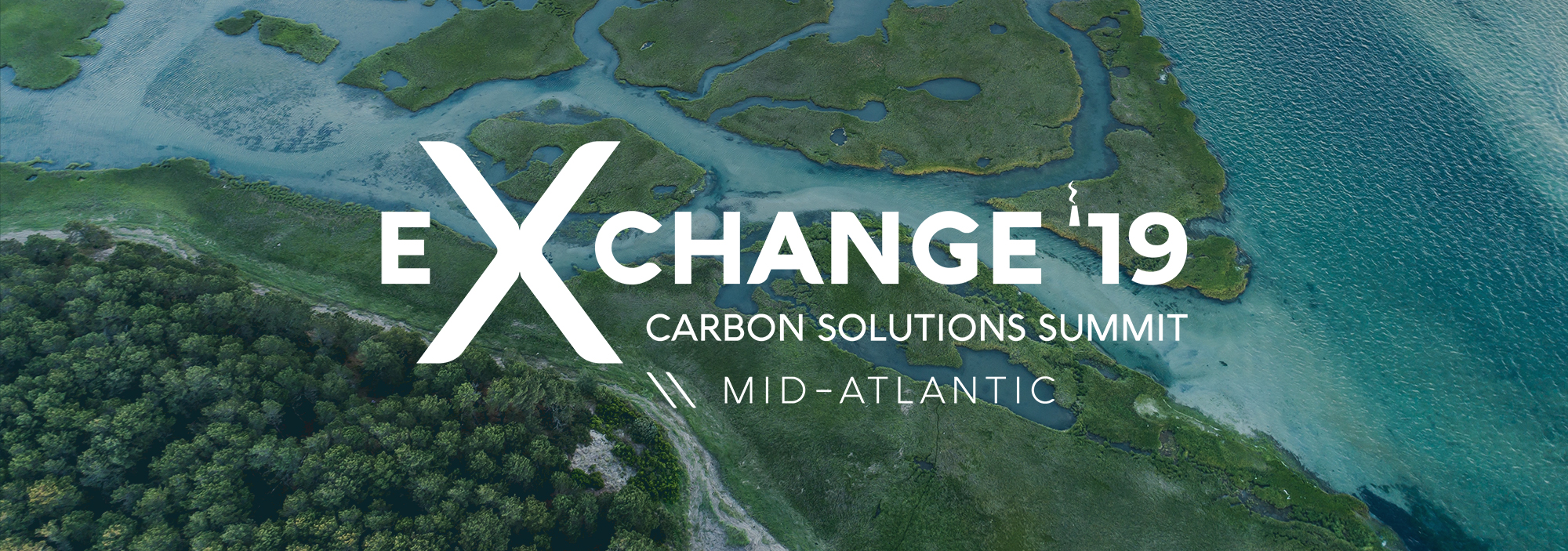This week, Climate XChange held the Mid-Atlantic Carbon Solutions Summit, a second in a series of regional gatherings we are holding this fall. Earlier this month, the team spent the week in New Mexico for our Southwest Summit, and in November, we’ll be in Minneapolis for the Midwest Carbon Solutions Summit.
Momentum for carbon pricing has been building tremendously over the last couple of years. While in 2016, only three states introduced carbon pricing bills, last session, that number skyrocketed to 16. We anticipate that even more states, both red and blue, will introduce (and pass) such legislation in the years to come.
It’s not just states that are beginning to understand we must begin accounting for the true costs of dirty fuels; earlier this month, the International Monetary Fund (IMF) deemed carbon pricing “the single most powerful” tool to address the climate crisis. The recent election in Canada was also an overwhelming reaffirmation of public support for and interest in meaningful action on climate, including their relatively new national carbon pollution system.
More and more, individuals recognize the enormity of the climate crisis, and the need for immediate and significant greenhouse gas emission reductions – we have seen this trend translated into staggering growth in our own State Carbon Pricing Network. Today, the network is made up of nearly 2,500 advocates, business leaders, and policymakers from all 50 states who are committed to state-level action on this issue.
Over the last few months, the number of advocates and community leaders who have reached out with specific questions and requests for support have proliferated. We receive requests on everything from understanding household-level impacts, communicating the issues, and engaging the media, to ensuring environmental justice communities are at the table. At the same time, dozens of legislators intent on reducing their states’ emissions are working with our research team to design effective and equitable carbon pricing legislation.
In response to this increasing need for collaboration and support, and with the aim of convening key stakeholders to examine the different effective and equitable climate solutions, our Climate XChange team spent this past week in Maryland for our Mid-Atlantic Carbon Solutions Summit.
A Recap of our Summit in Maryland
Our week in Maryland was an opportunity to welcome the newest addition to our Climate XChange team, Wandra Ashley-Williams. Wandra, an accomplished community activist and elected official, will be directing Climate XChange’s efforts in Maryland and working closely with our on-the-ground partners in the region to pass meaningful legislation. Wandra is the Vice President of the Maryland State Conference of the National Association for the Advancement of Colored People (NAACP) and has served on the Clean Energy Jobs Initiative Board of Directors, where she advocated for the passage of the Maryland Clean Energy Jobs Act. She also serves on the board of the Maryland Legislative Agenda for Women (MLAW) and the NAACP National Environmental and Climate Justice Program Committee. We’re so excited to have her join our organization, and for the leadership she will bring to the state’s efforts
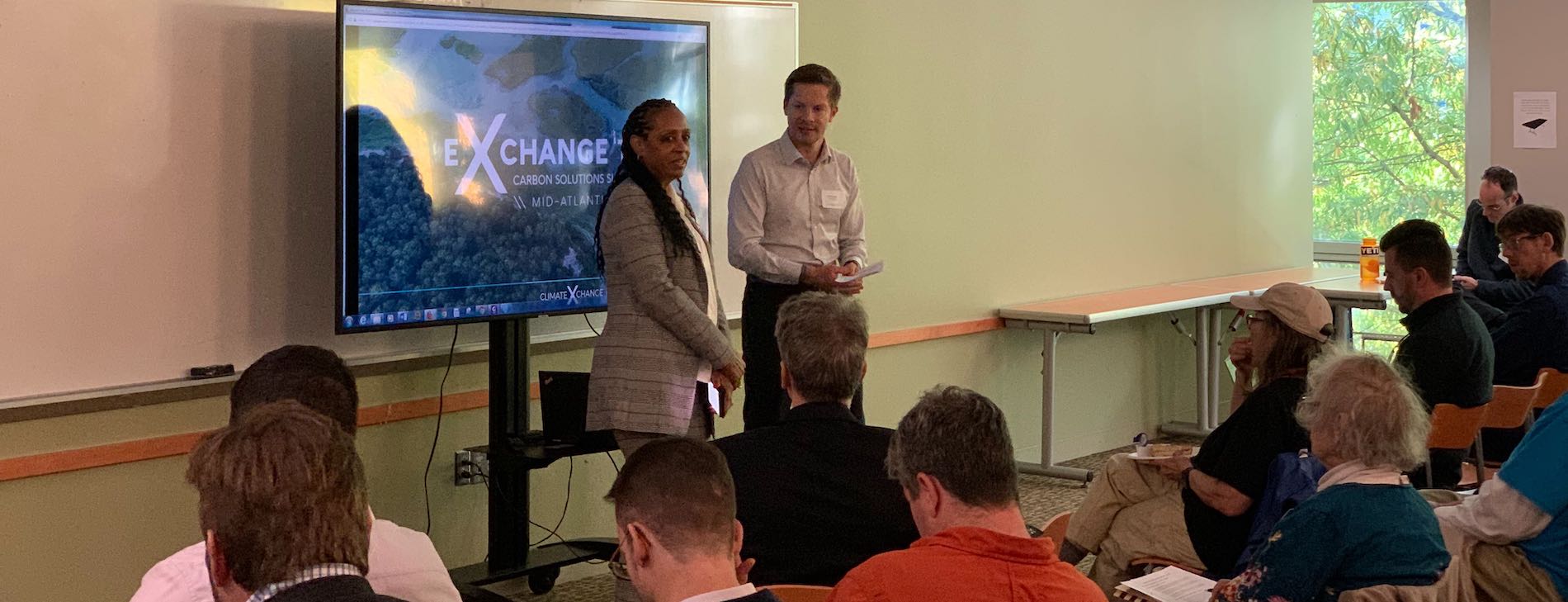
More than 100 advocates, business leaders, and policymakers from throughout the Mid-Atlantic region came together to discuss how states can move strong climate policy forward.
Maria Virginia Olano, who spearheads Climate XChange’s communications work, spoke to advocates and community leaders on best communication practices. Maria went over our work on climate communications, research on best practices, and story-telling tools that are important in advancing a new, positive and hopeful narrative on the climate crisis. As advocates and professionals in the space, we are in charge of communicating not just the problems we currently face, but also bringing to life the solutions and future we envision. Communication has been a massive challenge in the space, so this workshop explored the reasons for this challenge, the psychological and social barriers in translating knowledge into action, and concluded with a series of best practices.
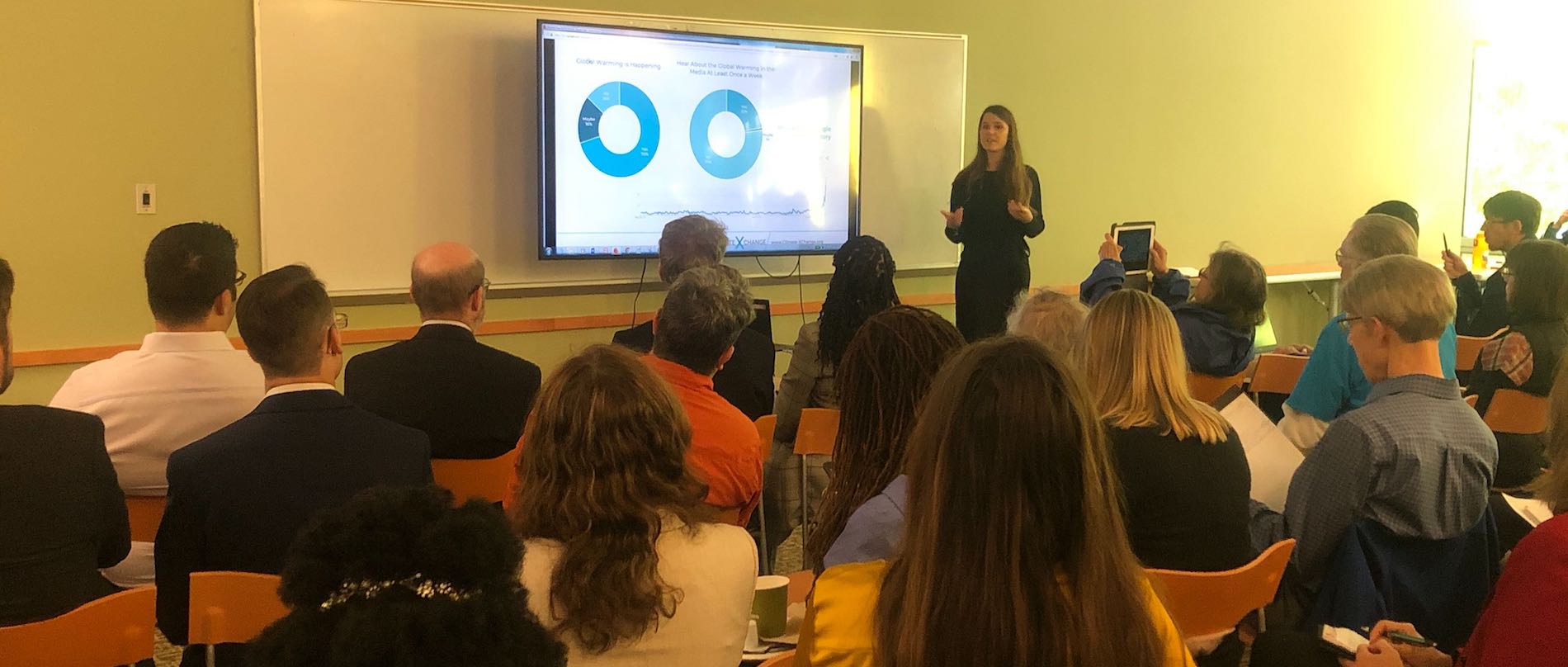
Dr. Marc Breslow, CXC’s Research and Policy Director, broke down the research behind carbon pricing policy and highlighted its enormous opportunity for investment. Dr. Breslow went over his research on how how carbon pollution pricing will reduce Maryland’s emissions in line with state-mandated reductions for 2030 and beyond. Participants then broke off into discussion groups where they could better voice concerns, visions for future action, leverage points, and needs as they saw them. The exercise revealed some priorities for the region, such as the need to address congestion, pollution, and fund coastline adaptation – all things that can be solved through a price on carbon pollution at the state or regional level.
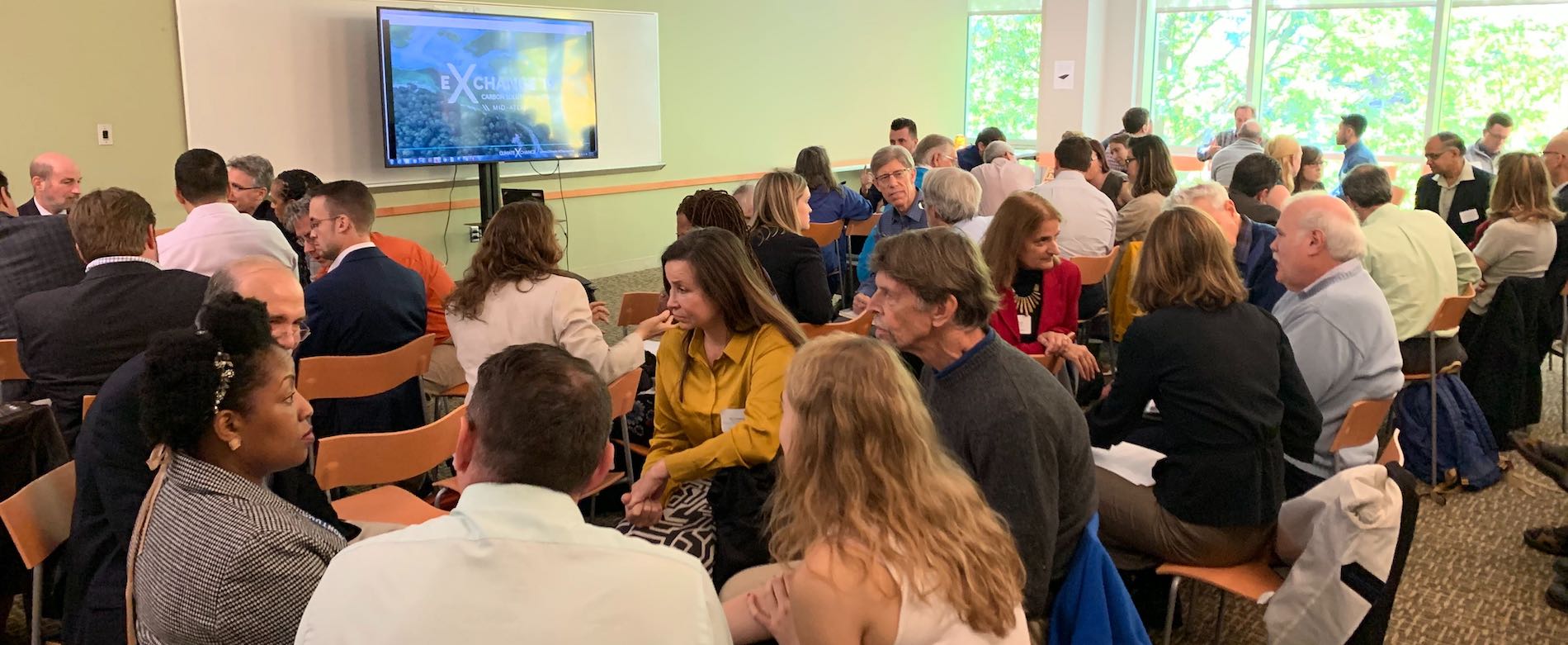
New creative policy ideas and other solutions were also widely discussed, among them the need to innovate workplace expectations, introduce more widespread telecommuting, and compile comprehensive and democratized data to track impacts and emissions reductions. These discussions and listening sessions are incredibly productive, especially in a room full of diverse backgrounds and priorities. It is only through inclusive dialogue that we will gain support for policy solutions and make them the best they can be. Something else that becomes clear after dialogue like this is that there will not be a single silver bullet that tackles the climate crisis and its impacts in the state and region – rather, we need to embrace widespread avenues for action, and an “all of the above” approach to solutions.
After the morning Summit, we held an evening reception at Founding Farmers, a conscientious restaurant that prioritizes sustainability and environmental action. Founding Farmers, a Certified Green Restaurant, is supplied by hundreds of family farms across the country. On top of delicious local food, the event featured powerful remarks on the importance of moving solutions forward and the massive momentum the region has to see them through.
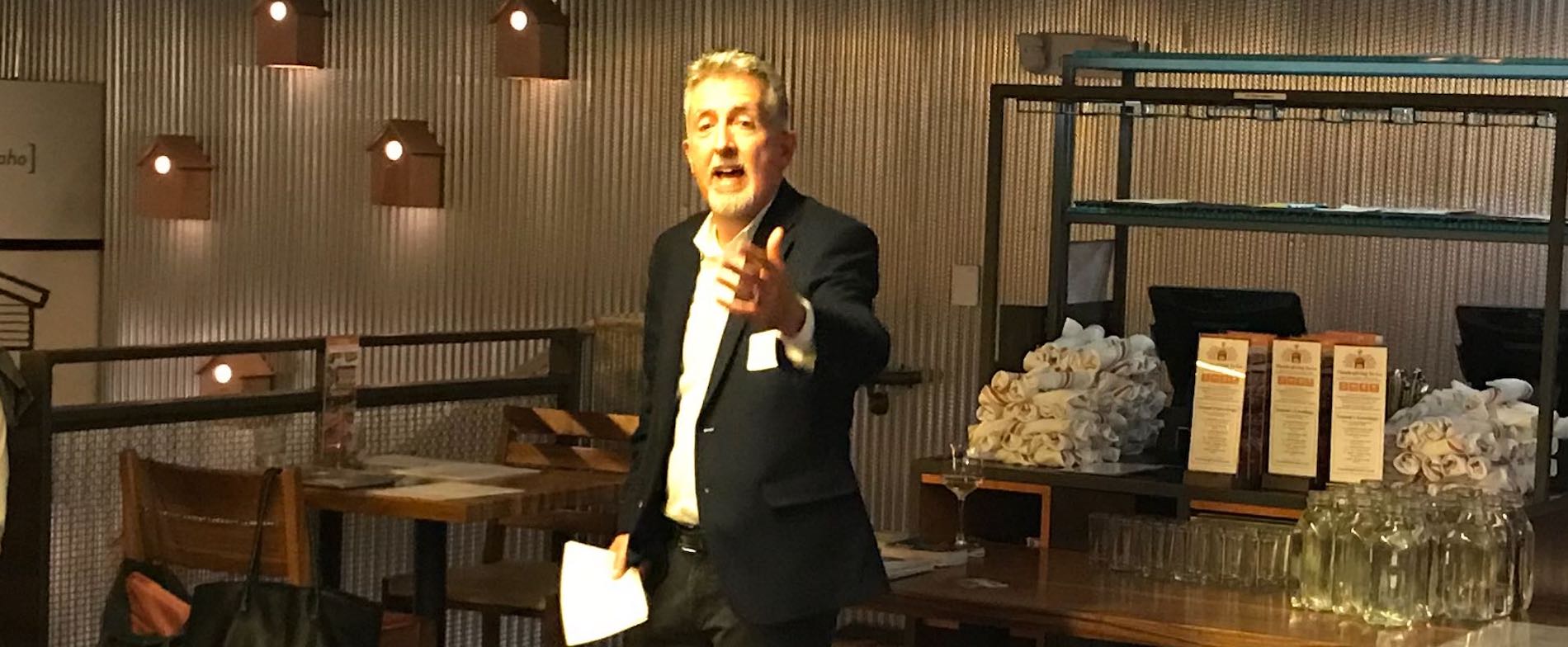
Dan Simons, the restaurant’s co-owner, emphasized the urgent need to put a price on carbon pollution and the critical role businesses should play in promoting sustainable practices. He also highlighted the importance of conscious capitalism and the success that can come from truly putting mission over profit for businesses like his. Mike Tidwell, founder of Chesapeake Climate Action Network, spoke on the growing political momentum for climate action, and Adele Morris, a Brookings Institute Policy Director and leading global expert on carbon pricing policy design, discussed her recent research and the economic case for the policy. A huge thank you to Dan, Mike, Adele, and all those in attendance for joining us, and leading on this important work.
To close out the Summit, we convened legislators and key advocates from Maryland and Virginia to discuss each state’s unique political circumstances and potential for strong climate action. Page Atcheson, the Executive Director of Our Climate, highlighted the role students across the country have played in mobilizing support and pushing for climate policy.
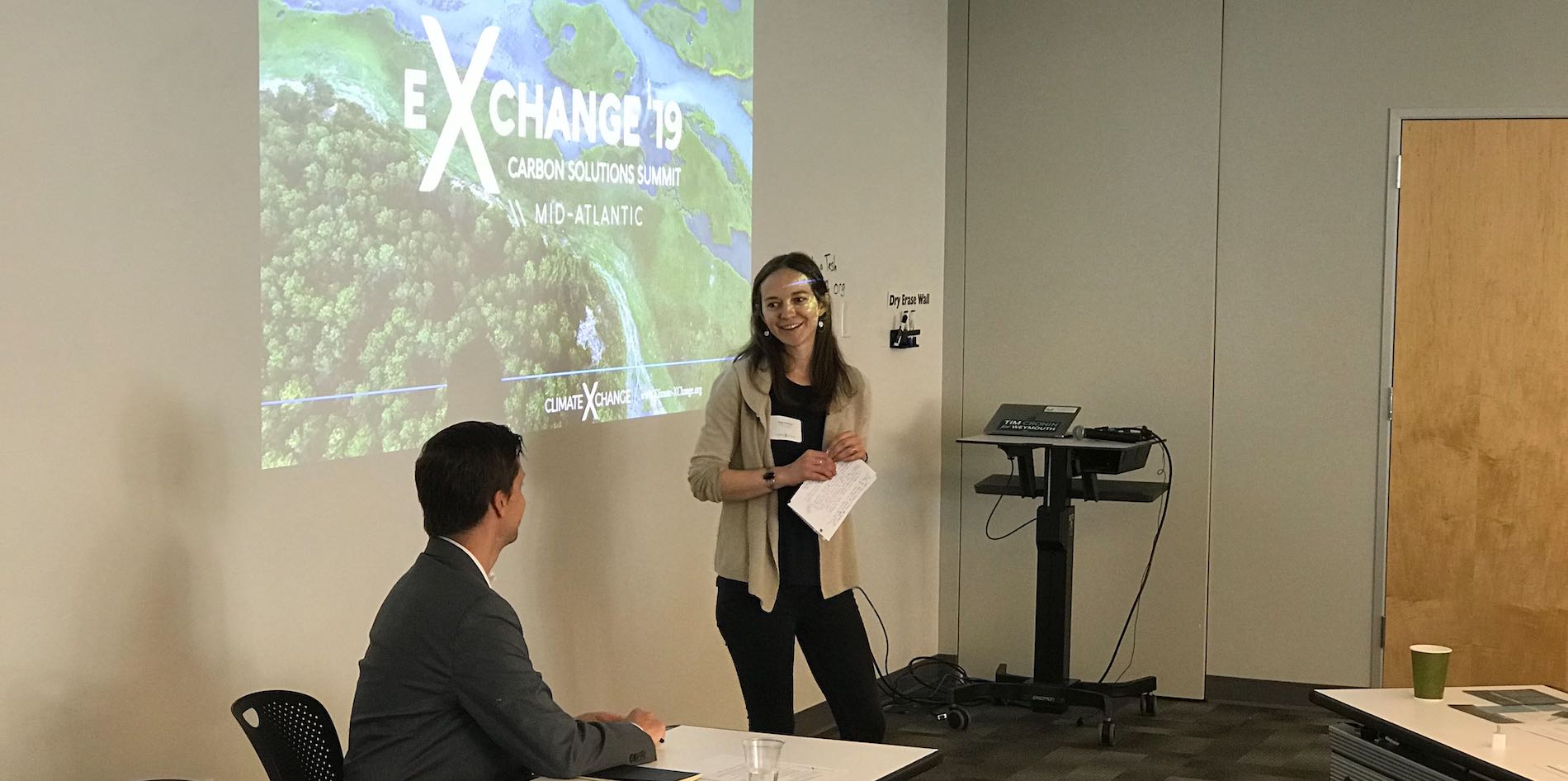
The Roundtable conversation, held at AECOM’s Germantown Office, was a unique chance to hear from legislators about their leadership in advancing climate policy, the unique opportunities they currently have in each state, and what they hope to accomplish. Maryland Delegates David Fraser-Hidalgo and Jared Solomon lead a conversation on the pathway toward decarbonization. Delegates Lily Qi and Shelly Hettleman, among others, discussed the various opportunities Maryland has to reduce emissions and combat climate change. From Virginia, Delegate Mark Keam led a dialogue on the state’s rising momentum for climate action, and increase in Democratic legislators who see this as a priority. It was encouraging to see leadership from elected officials, and their plans to pass meaningful policy; it is also important to continue facilitating these dialogues and provide avenues for cross-collaboration and learning – it was an honor to be surrounded by so many of the brightest minds leading in this space.
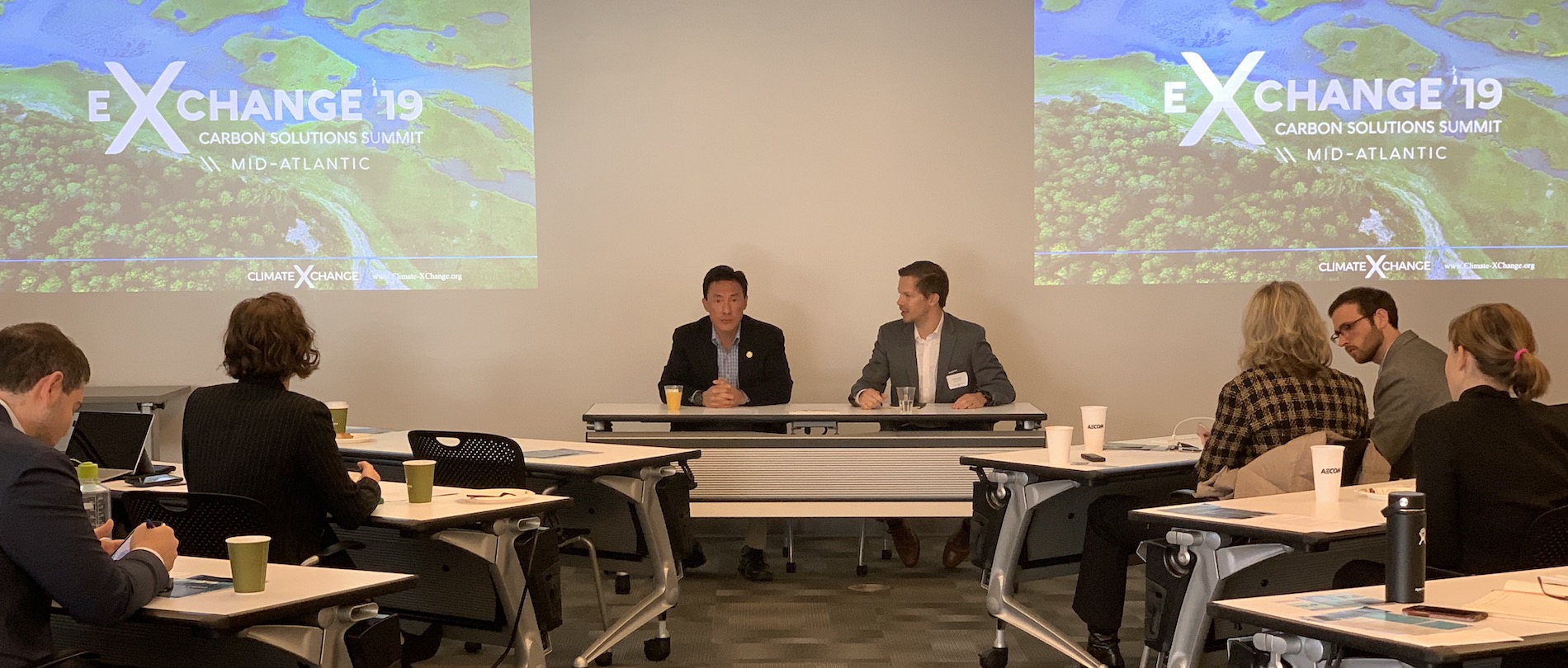
Throughout the two days, we were joined by our partners and friends from the World Bank, Our Climate, Chesapeake Climate Action Network (CCAN) Climate Reality Project, Citizens Climate Lobby (CCL), Sierra Club, the Nature Conservancy, and dozens of others.
Where We Go From Here
Thank you to all who participated and engaged in thoughtful conversation this week. We will continue supporting ongoing efforts to put a fee on pollution in any way that we can, be it by providing bill-drafting assistance to policymakers, conducting state-specific research studies on the impacts of a carbon fee, or training advocates and organizers on how to best communicate the solutions to this crisis.
Wandra Ashley-Williams, CXC’s new Maryland Regional Director, will work with our partners to push forward strong climate policies, and our State Carbon Pricing Network will continue connecting and supporting advocates and leaders from across the nation.
Leaders, stakeholders, and elected officials at all levels of government now recognize that we cannot wait to act on this issue. Millenials and Gen Z will make up the largest block of voters across the country by the next election, and they are a demographic that largely identifies climate as a top priority – momentum and opportunity have never been higher. What will come next is the critical work of crafting comprehensive plans, introducing and passing policy, and mobilizing communities around support for solutions that work for them. Discussions and collaboration like the ones we facilitated this week will need to continue happening and we look forward to being a part of that process along with our local partners and allies.
Next up is our Midwest Carbon Solutions Summit, an event that will convene hundreds of key stakeholders and advocates from across the region at the University of Minnesota.

